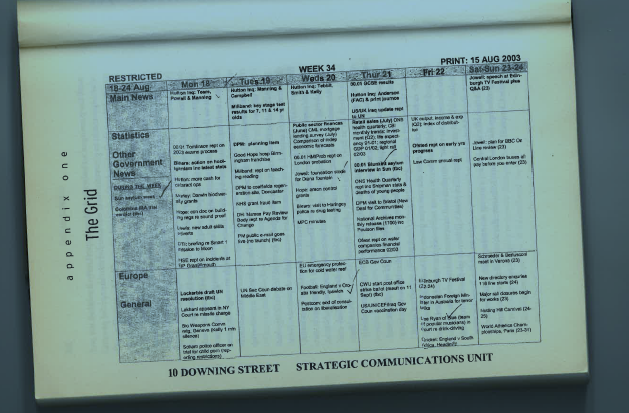If you work in an organization dealing with more than a handful of policy issues, it can get hard to keep track of where things are.
A lot of organizations (firms, NGOs, trade associations) keep this information in their heads.
I am not so smart. I just can’t keep track of 5 legislative and policy files at the same time. I am impressed with the many who can. Telepathy and didactic memories are more common than I realised.
There are two tools that will make you and your colleagues lives a lot easier.
The Grid
Alastair Campbell introduced the Grid into Downing Street in 1997. It keeps track of main announcements and initiatives for the next weeks (see link).

Source: Alastair Campbell, Peter Oborne and Simon Walters, Appendix one
I’ve found it a useful tool to adapt for any organization doing more than 3 pieces of work.
It helps ensure that you are not meeting the same person, not releasing two competing press releases on the same day, or hosting an event during a public holiday.
Issue Tracker
When you are working on several proposals/initiatives, you can’t keep in your head what you need to know about all the files. The best way to communicate this information is by crisp issue trackers, updated once a month.
An issue tracker should contain:
- Background: What’s the file about. What’s driving it.
- Why you are working on it. Why is the proposal important to you. What is the likely impact. People love to work on issues because of the ‘principle’. Focus only on what’s important and what you can do something about. If you can’t influence it, don’t work on it.
- State of Play: Where is the file and what are the next steps. Work out by 3-6 months. After that timetables get blurry. Are you working on the Commission adoption stage or legislative stage and what step are you at. The same applies if you are working on a agency procedure and subsequent implementing act, RPS measure, or delegated act.
- What are your main message/objectives – an aide memoire for when you and your colleagues are speaking with people about your issue(s). Don’t pretend you can memorise speaking points with evidence for more than 3 legislative files at any one time. I defy most people to hold just one file in their head.
- What you are going to do: Who are you going to meet, events you are hosting, press releases, media events. This is a simple 1-2 month ahead plan. It’s a great way to keep track of progress.
- Who is leading on the work: Put their name, email, and mobile number down. Useful to have when you are query on a Sunday afternoon.
- Who are the key people working on the file. It is useful to know who the key officials and politicians working on the file. If you are meeting the same people on multiple proposals you can bundle your meetings together.
- What type of proposal are you working on. If you are working on ordinary legislative proposal or secondary legislation(implementing act, delegated act, or RPS measure), the process and votes needed are different. Better put down on paper what they are.
Put this down in plain English in around 300-400 clear words. Font 12 please.
Why not to do this
A lot of people don’t like to do this. They think it creates extra work. These people are gifted. They are able to keep a lot of information in their heads and communicate it by telepathy. If you spend 5 minutes a month updating the issue sheet, all your colleagues get to know what they need to know, and they don’t have to call , email, or telepath with you.